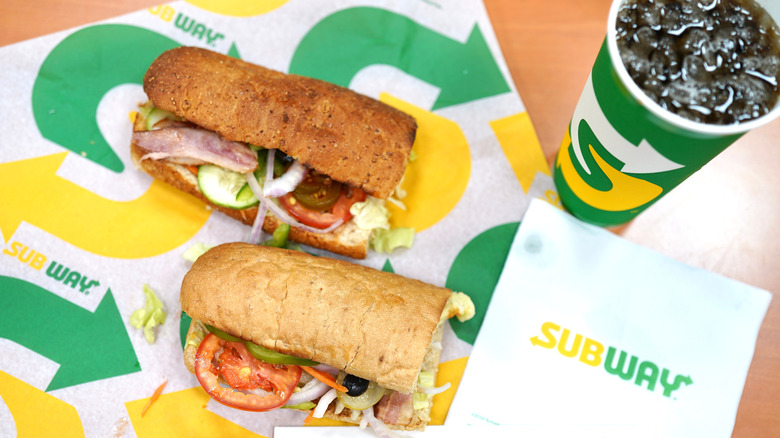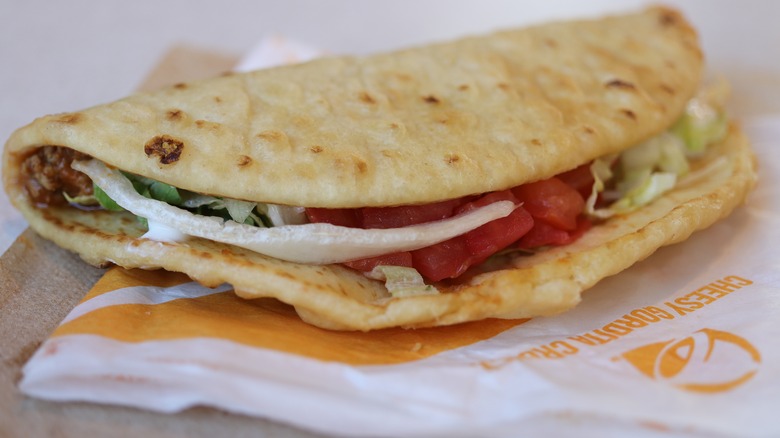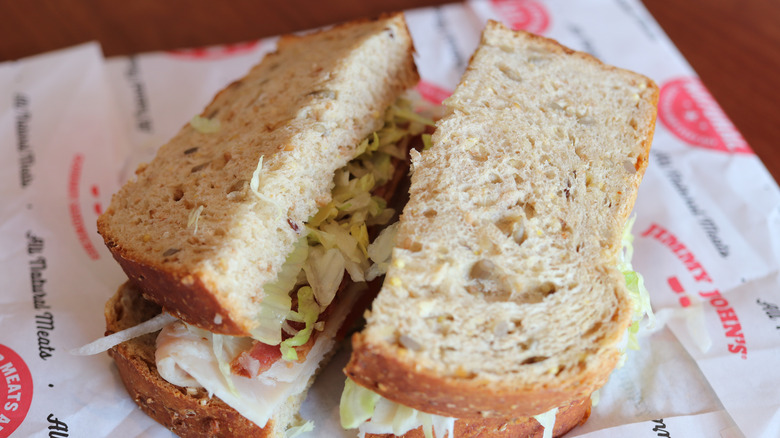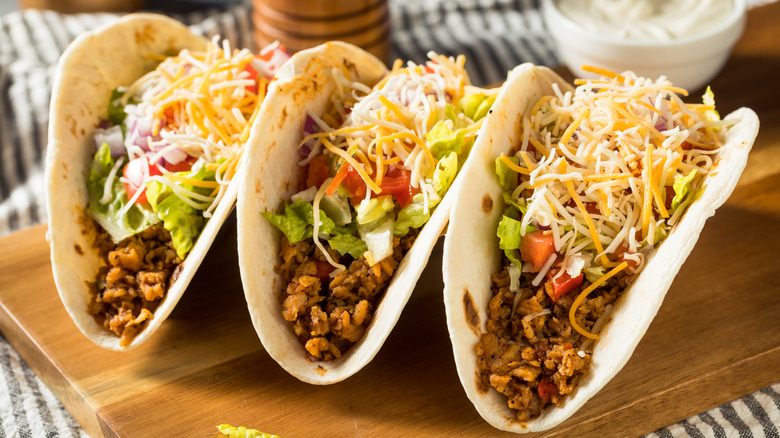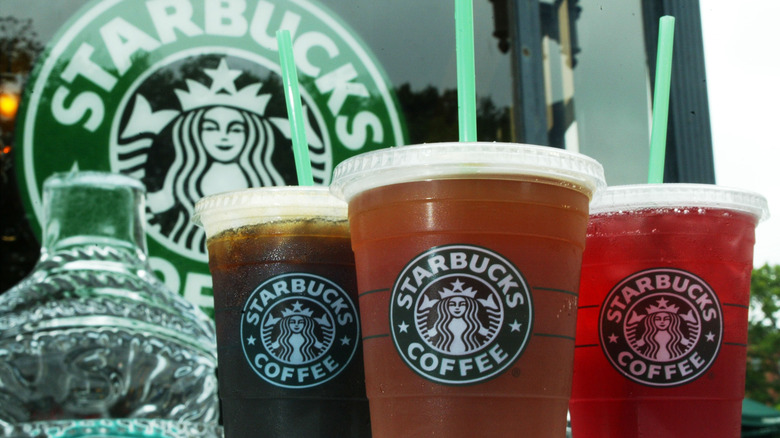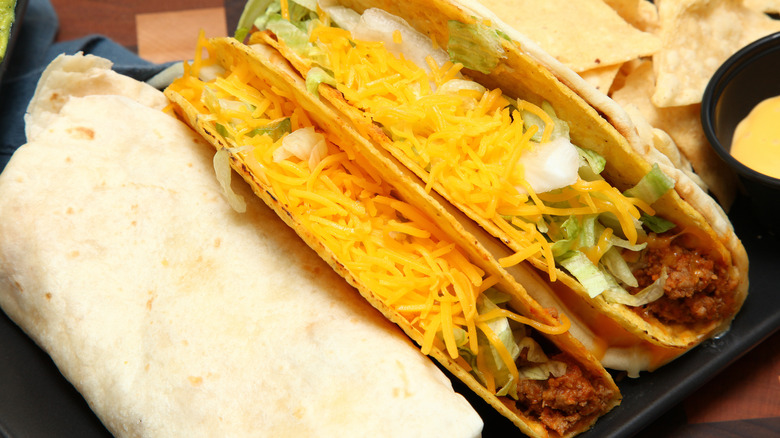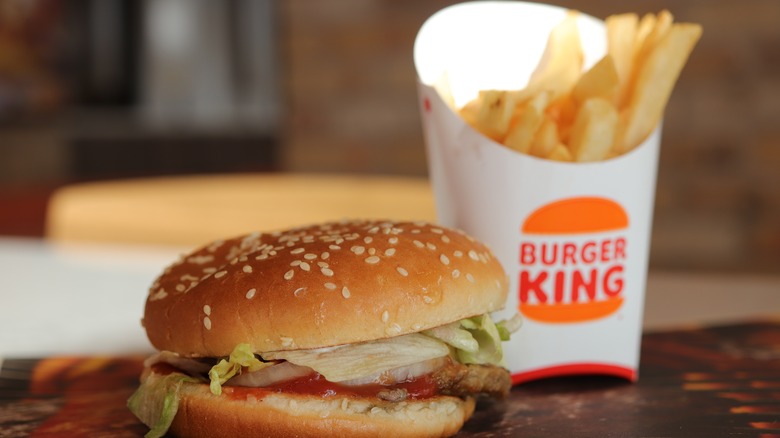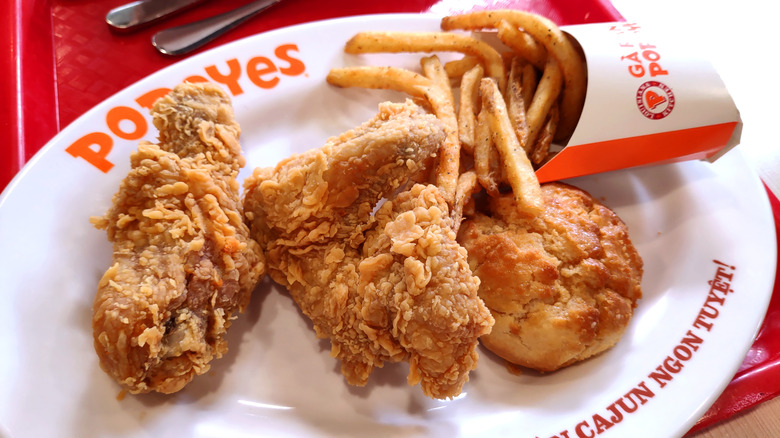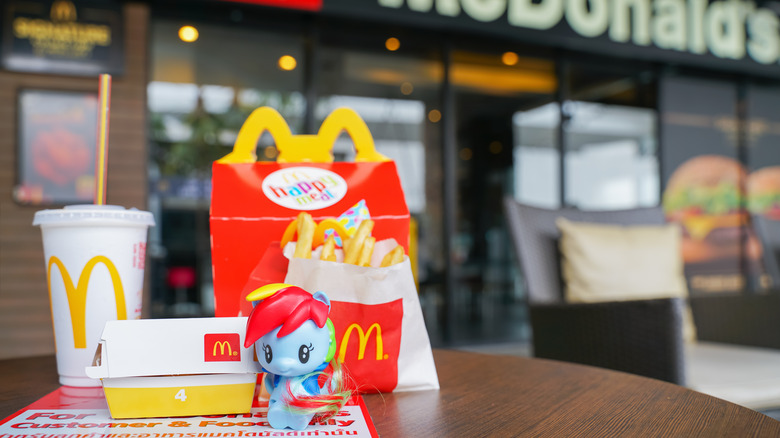12 Of The Wildest Fast-Food Lawsuits We've Ever Seen
We've all heard about the McDonald's coffee lawsuit in which a customer was awarded a huge settlement after spilling a cup of hot coffee on her lap. Although this is often cited as an example of a frivolous case where the person should have realized that hot coffee would be hot, the Tort Museum explains that McDonald's was knowingly heating its coffee to such high temperatures that had the potential to seriously burn an individual. While this lawsuit may have been rightfully filed, it doesn't mean that every fast-food lawsuit out there has similar merits.
In fact, there are actually several other legal incidents that are downright ridiculous. From claims about too much ice to planted fingertips and sandwiches that were slightly shorter than advertised, reading through these absurd cases should make it all too clear that a number of people are looking for any way to make a quick buck. Here are the wildest fast-food lawsuits we've ever seen.
1. Subway: Footlong fabrication
Even if you've never eaten at Subway, you've certainly seen commercials advertising "footlong" sandwiches. And, if you have a basic understanding of measurement, you know that one foot is equal to 12 inches. Well, according to Reuters, some customers actually measured their Subway sandwiches, only to find that some were not the full 12 inches they were promised. They filed a class action suit, claiming that the company was being deceitful by promising footlong subs without actually living up to its word.
Initially, a federal judge in Wisconsin approved a settlement between the company and the plaintiffs. The settlement covered the plaintiffs' lawyer fees and awarded them each a $5,000 incentive award. Additionally, Subway was required to improve its bread-baking practices to make sure that the sandwiches were as long as they were advertised to be (six or 12 inches).
Lawyers for the company argued that the weight of each sub was the same and that natural variations during the baking process led to slightly different lengths. Each customer, they said, was still getting the same amount of food and nutrients regardless of whether their sandwich was the full 12 inches long or just 11 inches. The 7th United States Circuit Court of Appeals agreed with this logic and tossed out the settlement, calling the lawsuit "utterly worthless."
2. Taco Bell: What do you mean, prices may vary?
"Prices may vary." It's a disclaimer we're all used to reading in advertisements and hearing in commercials. Most of us understand this phrase to mean that just because we see one price advertised for an item, the actual price when we go to purchase it might be different. One New Jersey couple clearly didn't understand the disclaimer, or at least didn't think it should apply to them.
Law & Crime shares the story of Nelson Estrella-Rosales and Joann Estrella who purchased two Chalupa Cravings Boxes from Taco Bell, paying $5.99 for each box. The problem? They had seen a Taco Bell commercial promoting the boxes for the mere cost of $5. Well, this $0.99 difference (or $1.98 total for the two boxes) was enough to upset the couple and cause them to speak to the store manager. When they were informed that each Taco Bell is a franchise, and as such, sets its own pricing, they were not satisfied. They decided to sue Taco Bell for violating the New Jersey Consumer Fraud Act.
However, the pair failed to read the fine print in the commercial, which specified "at participating locations for a limited time. Prices may vary. Tax extra." Because this disclaimer was included in the commercial they viewed, the judge dismissed the suit, saying that Taco Bell did all that was necessary to show the potential for variable pricing.
3. Wendy's: Finger(tip)s crossed that this will work
I think we all can agree that finding a severed fingertip in your food is a good reason to be disgusted, and even a fair cause to sue the establishment. However, this story plays out a little differently. Anna Ayala sued Wendy's after finding a severed fingertip in a bowl of chili she ordered. The catch? CBC reports that Ayala was in fact responsible for putting the finger in her food.
Ayala's husband, Jamie Plascencia, reportedly purchased the severed fingertip from a coworker who had injured himself in an accident. Authorities discovered this after some of the evidence just wasn't lining up. First, none of the employees at the Wendy's location were missing their fingertips, nor were there any reported injuries from the company's food suppliers. Moreover, after forensic testing, it was shown that the fingertip hadn't actually been bitten into as claimed.
Ayala and her husband were charged with conspiring to file false claims and attempted grand theft. They both pleaded guilty and were sentenced to time in prison (nine years for Ayala and 12 years for Plascencia). Apparently, Ayala didn't learn her lesson about lying, though. USA Today shares that she was arrested again in 2013 after lying that her son was shot in the ankle by two people. It turns out that he had shot himself by accident, but didn't want to face felony charges for possessing a firearm.
4. Jimmy John's: Missing sprouts
This story is pretty wild. After receiving the sandwich she ordered from Jimmy John's, Heather Starks noticed that the sprouts included in the item's description were not in the sub. While this may have been a bit frustrating, rather than simply asking the employees to provide her with a few sprouts to add to the sandwich or complaining to the manager, she took a different approach, according to Consumer Products Law Blog. Starks initiated a national class action lawsuit against Jimmy John's with a wide range of claims, including negligent misrepresentation, fraud, and violation of California's False Advertising Law.
Rather than deal with taking the case to court, Jimmy John's opted to settle it early. Starks was awarded $5,000 to (more than) compensate her for the lack of sprouts as advertised. Her attorneys were also paid $385,000 to cover their fees and expenses. Furthermore, any Jimmy John's customer who felt that they were similarly misled and "defrauded" could receive a $1.40 voucher, with the restaurant promising to award up to $725,000 in vouchers.
5. Burger King: Misleading advertising
If you're sensing that many of these fast-food lawsuits are related to false advertising, you're right. Individuals looking for an opportunity to make some money pay attention to any claims that may not be 100% true and use them to their advantage. Take this class action lawsuit headed by four Burger King customers against the company. According to Law & Crime, the plaintiffs believed that the advertisements for the menu items were false and misleading, causing them to purchase food that they may have otherwise avoided.
The lawsuit claims that starting in 2017, Burger King's advertisements began overstating the size of the hamburgers. Compared to the commercials that were aired before 2017, the new burgers were 35% bigger and the patty itself looked nearly two times larger than it previously had. However, despite these illusions in the advertisements, Burger King never changed any of its recipes or ingredients during the specified time period. As such, the suit claimed that the advertisements were "unfair."
Furthermore, the claim argued that the false advertising was financially damaging to the plaintiffs. These individuals were under the impression that they were spending their money on more food than what they actually received. Apparently, this wasn't the first complaint against Burger King for a similar reason. In the early 2000s, the U.K.'s Advertising Standards Authority said that the company's advertisements made the burgers seem misleadingly large based on the proportion of a hand they actually filled.
6. Popeyes: Not enough chicken sandwiches
It wasn't that long ago that Popeyes released its chicken sandwiches. They became popular so quickly that it became difficult to find any available to try. Eager to taste them, some customers visited a few different Popeyes in the hopes of lucking out and finding them available to purchase. One man from Tennessee, Craig Barr, sued the company over the chicken sandwiches in question. However, the reason for the suit is not exactly what you might think.
NBC News explains that Barr said he was misled by an individual's ads on Craigslist saying that he had access to extra chicken sandwiches and was willing to sell them. The man claimed to work at Popeyes and was charging $25 for the sandwiches (a pretty steep markup). Barr was eager enough to try the sandwich that he agreed to pay the cost. However, when he was driving to meet the man to pick up his sandwich, he damaged his car's rims and tires. This resulted in $1,500 worth of damage to his vehicle, prompting Barr to sue Popeyes for $5,000 total. You can't make this stuff up.
7. Taco John's: Taco Tuesday tussle
Taco Tuesday is such a commonplace phrase, whether you hear it from your friends looking for a fun night out or from a local restaurant advertising its specials. However, what most of us don't know is that the phrase has been registered since 1989, well before it became so popular. Insider reports that a Wyoming-based restaurant called Taco John's first took the steps to trademark the saying, and has been using it for advertising and sales purposes for years.
In an attempt to protect its trademarked phrase and to stop others from profiting from it, Taco John's has sent cease and desist orders to various businesses, including a local brewery (via Yahoo! News). At the time of the order, many experts predicted that the company would have hardly any chance of a successful court case. Taco Tuesday is so commonplace nowadays that it is unlikely that a judge would allow it to be owned by any one restaurant. According to Vice, the restaurant Taco John's was suing decided to avoid trouble by changing the name of its weekly promotion to "Ole Tuesday."
8. Starbucks: Too much ice
Can you believe Starbucks' audacity? The chain serves its iced coffee and other iced beverages with ... wait for it ... ice! Stacy Pincus started a class action lawsuit against the company for adding too much ice to its iced drinks. According to NBC News, the suit placed Starbucks at fault for tricking its customers into paying for more than they're actually getting.
According to Pincus and her lawyers, customers order a 20-ounce drink expecting to get 20 ounces of liquid. Instead, they receive less than the full 20 ounces of liquid because of the amount of ice filling up the cup. They claimed that Starbucks was deliberately under-filling drinks and adding too much ice to increase its profits.
Chicago Tribune reports that a judge in California dismissed a similar lawsuit against Starbucks. The judge's dismissal cited that consumers should understand that the number of ounces for iced beverages also includes the ice necessary to make it an iced drink.
9. Taco Bell: 35% isn't enough
In 2015, Fox News reported that an Alabama law firm filed a class action suit against Taco Bell on behalf of Amanda Obney, a resident of California. The firm reportedly tested the contents of Taco Bell's beef tacos to see what percentage of beef they contained. According to their analysis, they were just 35% beef. Obney was not looking for monetary compensation and claimed that she only wanted Taco Bell to engage in truthful advertising and stop misleading its customers.
Throughout the suit, Taco Bell asserted that its tacos contained 88% beef, far more than the 35% the firm was claiming. According to CBS News, the law firm eventually dropped its suit after failing to gain any real traction. It seems that they didn't have enough of a case against the fast-food giant and that the analysis backing up their claim may have been questionable. Since the case was dropped, the firm has stopped talking about it or even referring to it on its website, further indicating that it wasn't really in a position to win.
10. Burger King: Impersonating a band
This lawsuit involves a heavy metal band, a fast-food restaurant, and, um, chicken masks. Burger King added chicken fries to its menu in the early 2000s and developed a commercial to promote the new menu addition. In the commercial, a pretend heavy metal band called COQ ROQ was portrayed advertising the chicken fries.
COQ ROQ members all wore masks that were supposed to resemble chickens. According to The Smoking Gun, the only problem was that the masks looked very similar to those donned by Slipknot, a real heavy metal band. The band sued the fast-food chain and its ad agency for this close resemblance. Burger King fired back against Slipknot by filing a countersuit. This lawsuit stated that Slipknot was actually stealing ideas and parodying the masks used by KISS, Mushroomhead, and numerous other rock bands that use some form of costume to enhance their image.
11. Popeyes: It don't cut like a knife
If your fast-food order didn't come with a knife you needed to eat, what would you do? WLOX reports about an incident in 2015 when customer (and attorney) Paul Newton, Jr. ordered food from Popeyes. His meal, which included two chicken breasts, only came with a spork. Without the plastic knife he really needed to consume his food, Newton decided he'd have to eat the chicken by using his teeth to bite off pieces. His technique didn't work so well, and Newton ended up choking on the chicken. Upon receiving medical attention, he required surgery to remove the lodged piece.
In Newton's eyes, his medical emergency was Popeyes' fault, since the chain failed to give him a knife with his meal, forcing him to eat his chicken in an unsafe manner. Beyond the coverage for his medical bills, Newton was also looking for money to cover the pain and suffering the incident caused him, along with additional money for punitive damages. Moreover, he wanted a judge to rule that Popeyes must provide a knife in all future drive-thru orders. Ultimately, he dropped the lawsuit following what he described as "extreme comments directed to me and my family" (via Sun Herald).
12. McDonald's: Making Happy Meals look appealing to children
Antonio Bramante filed a lawsuit against McDonald's for promoting Happy Meals (you know, the meals for kids) to children. CNBC explains that Bramante took issue with the fact that the meals frequently feature toys that are connected with popular children's films. He didn't like that many of these movie-related releases included toys that his children wanted to collect, because their desire to hold the whole set prompted them to pressure him to regularly return to the restaurant.
Moreover, Bramante cited the fact that Happy Meal toys were being illegally marketed to children. Bramante lives in Quebec, where there is a law that prohibits targeting advertisements to children younger than 13, with a few exceptions. His lawsuit cited this law and noted that the toys from McDonald's were not one of the specified exceptions. In addition to asking the judge to prohibit McDonald's from continuing to market Happy Meals and the toys they come with to children, Bramante wanted the company to provide him with compensation for all the money he had been pressured into spending at the fast-food restaurant over the past five years.
Top Class Actions shares that the two parties in the case came to a settlement in early 2020. McDonald's not only agreed to change its advertising methods in Quebec, but it also paid $250,000 each to four charitable hospital foundations in the province.

